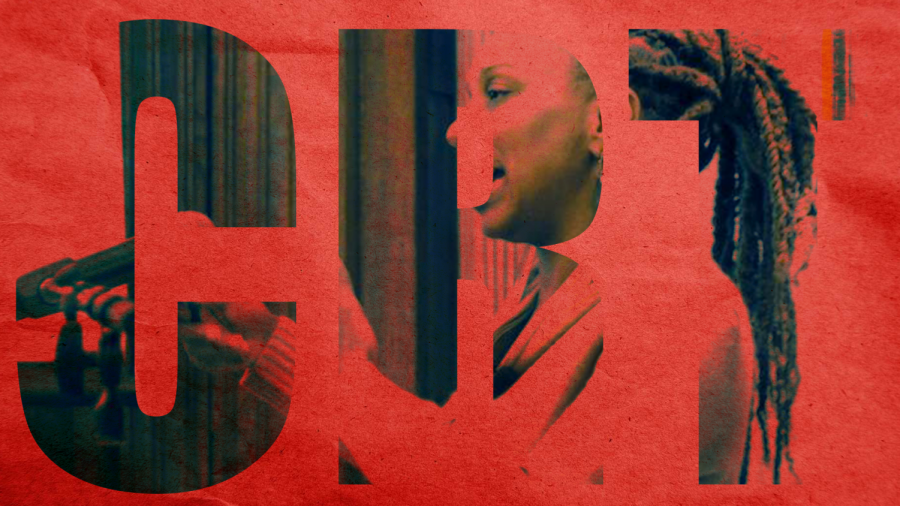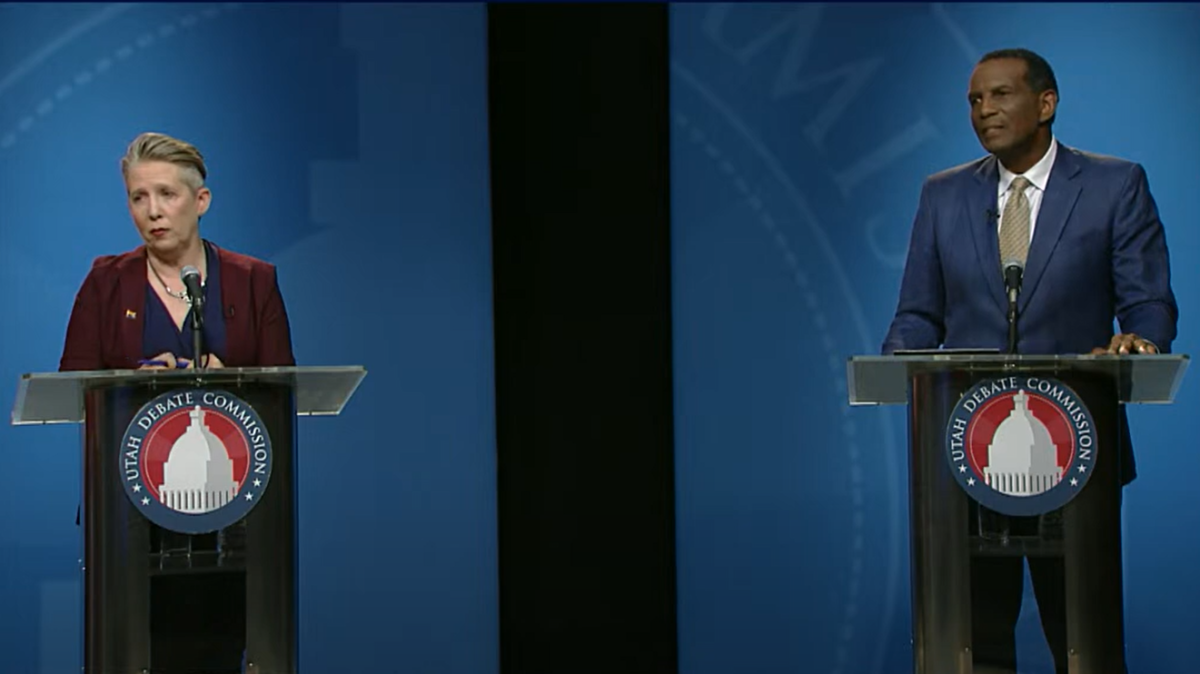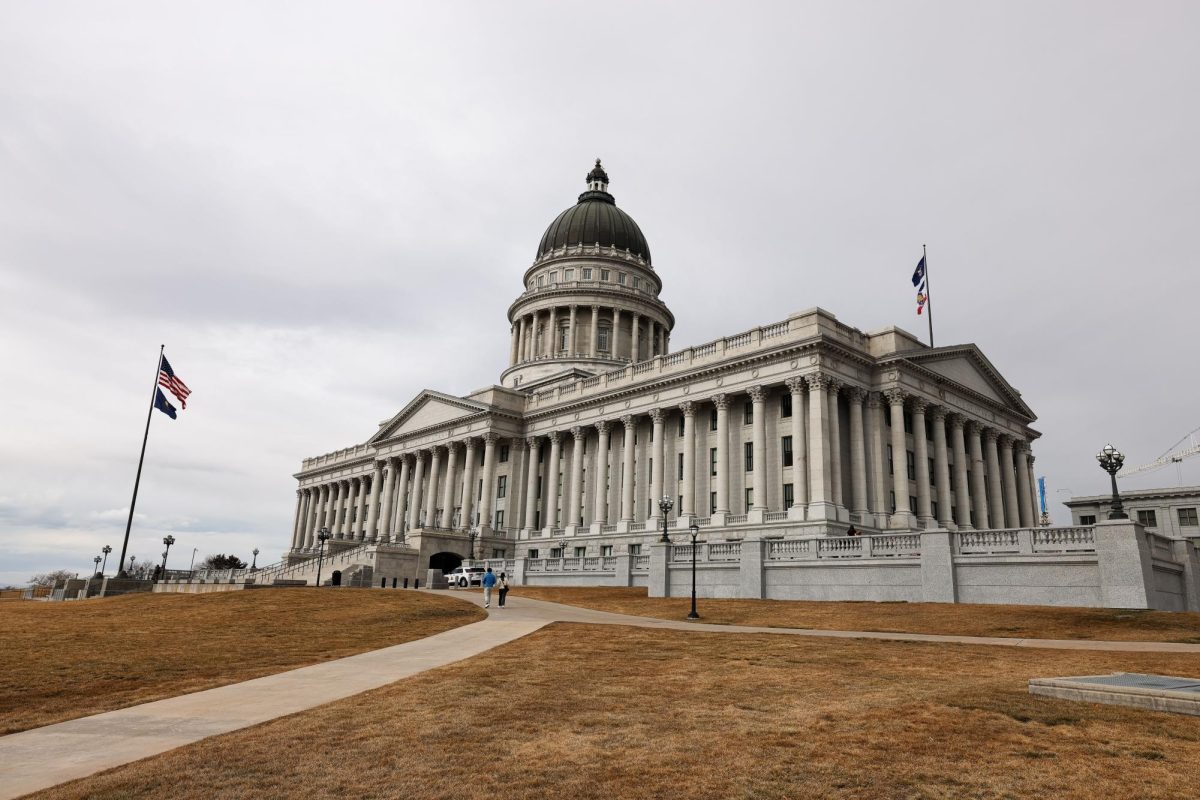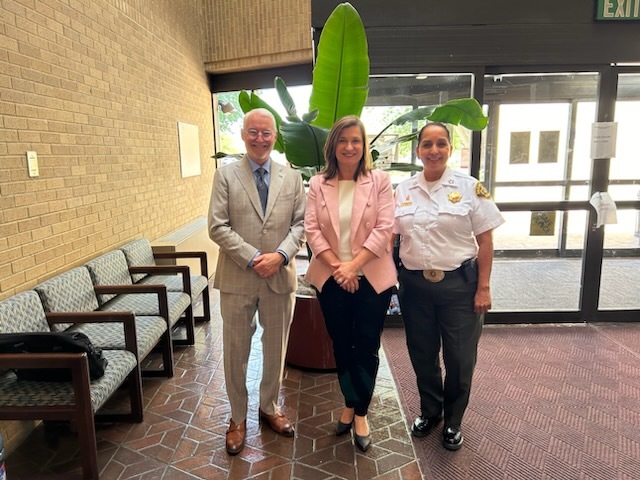Alexander: We Need Critical Race Theory
(Graphic by Cyan Larson | The Daily Utah Chronicle)
June 1, 2021
It’s been one year since George Floyd died and our nation demanded an end to police brutality against Black people. Our institutions, policies, laws and daily lives came under scrutiny as we reckoned with the racism rooted in our society. Companies stood in solidarity with Black Lives Matter. Several statues of prominent racists were removed. And in efforts to change pop culture, streaming platforms removed TV programs with exaggerated racial themes. Even legislators are continuing to push for police reform. This past year was the start of real change taking place in the U.S.
However, as we reflect on all we’ve accomplished this past year against racism in modern America, we must face the harsh reality of our incomplete victory. There’s still so much work to do, so many more people to reach and so many more voices that must be heard. We need to actively learn and continue teaching about race in America, and keep the conversation of societal change alive.
One way we can do this is through critical race theory, or CRT, an explanatory framework that confronts America’s history with contemporary racism. CRT’s efforts have revolutionized how we see race in our education systems and society. But right now, CRT is in danger of being scrapped entirely from the Utah education curriculum by state legislators and leaders. Critical race theory needs to be retained and taught in order for us to address and eradicate racism in America. Otherwise, our efforts against racism are futile.
First and foremost, we must understand the fundamental concepts of critical race theory to better grasp the history of race and how it affects society today. In essence, CRT interrogates the role of race in our society and critiques institutionalized racism as a legitimate problem instead of merely something of the past. Founded on the philosophies of lawyer and civil rights activist Derrick Bell, CRT constantly changes and evolves the way we see race as a powerful social construct implicating our lives.
CRT illustrates how racism flourishes in America and aims to eliminate institutional and law practices that allow racism to thrive. Ultimately, critical race theorists want to acknowledge racism’s influence on our past and create a better future where racism isn’t deeply rooted in society. Anyone who wants to see that future for themselves should understand and support the need for CRT.
Yet conservative lawmakers are trying to ban concepts of CRT in K-12 schools. Last year, former President Donald Trump attacked these racial discussions and denounced CRT as “divisive.” Now, in a bid to unify the GOP, CRT is once again under attack by Republican legislators and commentators. They argue that CRT advocates for discrimination against white people through the separation of “oppressor” and “oppressed,” which they believe creates a divisive dynamic among society. However, that’s not what CRT stands for.
Attempts to ban CRT actually preserve the racist attitudes found in society today. It simply works to bring the contributions of people of color back into history books and recognize racism as an ongoing crisis. Without teaching it in K-12 schools, we’re leaving the responsibility to higher education institutions, which not everyone attends. Waiting to teach something so vital to society is detrimental to students of color as well, who are exposed to racism as children. Often the students faced with racial adversity must fend for themselves. Teaching CRT early on, however, allows for students to fully grasp and fight against racism and racist practices that they see and experience.
CRT’s roots in the Civil Rights Movement should indicate its importance. It serves to confront the difficult reality of our nation’s past and decides how we talk about racial issues in the classroom. Civil rights teachings are in jeopardy because our nation vilifies any acknowledgment of its racist past.
It was only a couple of months ago when an Ogden school district temporarily allowed parents to opt their students out of Black History Month, so clearly the need for CRT remains as prevalent as ever. As an essential component to understanding the history of Black people and people of color in the United States, learning about CRT should be required. Glazing over America’s past genocide, enslavements, and overall brutality suppresses the vocalization of the suffering of people of color, almost as if their suffering doesn’t matter.
Rather than concentrate efforts towards removing CRT, we should instead better equip educators to teach CRT. The way it’s taught should not minimize the lesson, but empower students to confront and change their society’s continued acceptance of racism. Facilitating equity audits in schools will also aid teachers and administrators in improving the educational futures and learning of students of color. As long as we apply and teach CRT, we can change society’s perspective on race.
The harm that can come from banning CRT in the classroom pertains to more than just civil rights. Without CRT, we will fail to examine our history and society with a critical eye. Efforts to improve our institutions and dismantle systemic racism will fall short. Steps toward equality and measures for civil rights will not be adequate. It will only cause more division, more acceptance for racism, and more colorblindness. We need CRT now more than ever for the upcoming changes in our society, for the fight against racism, and for the future of the U.S.










John Hedberg • Jul 10, 2021 at 6:54 am
There’s a reason, O’Connor & William, that “guilt” is attributed by verified proof of acts by individuals, rather than being attributed by groups defined by immutable characteristics like race, gender, ethnic origin, or other identity. I learned that error, including hatred, war, slavery, and corruption, arise from ignorance, fear, vanity, and laziness. These are all human characteristics, yet the literal crime of CRT is that it seeks to teach young minds that these human attributes reside more or less in some groups of humans than in others, just as similar racism once taught that human gifts reside more in some groups than others.
In either case, all human characteristics present on an individual basis, and so the very best and worst attributes of humanity present themselves equally in every group, depending on choice and behavior of the individual person. You, and each of us, would like to be judged and appreciated for who we actually are as individuals, rather than being judged as a de-personalized or de-humanized concept, which is what happened to the Jews when the Nazi’s used their skin to make furniture, or when the Meso-Americans created hills made of the skulls of their human sacrifices, or when the pre-Ottoman Africans of Egypt sought to control the size of their slave population by systematically culling (killing) thousands of babies at a time. There are reports today of mass “re-education” camps in Communist China in which millions of slaves are being physically and psychologically tortured, experimented upon, and destroyed through mass murder, rape, sterilization, and Aushwitz-level abuse. Slavery, war, and corruption are pan-human and pan-historic, and what CRT attempts to do is redact past and present history in a way which attempts to attribute the worst of human characteristics only to certain groups it arbitrarily chooses, while simultaneously accusing these same groups they’re dehumanizing of dehumanizing others.
Ironically, a study of Nazi Germany shows that a similar CRT toward Jews is what led to Kristallnacht and concentration camps. That’s why CRT and similar racist, bigoted, hate-based ideologies are illegal: they literally killed millions of innocent people in the 20th Century, in previous centuries, and even in present century China. CRT, as taught, dehumanizes every group by the false premise that “you” and “your group” are any different than any other people in any other era in history. With Love, we’re individuals of immense worth and potential, children of an Infinite Love: we’re family. But unfortunately, by ignoring the potential misuse of our own diverse gifts and attributes, we make the assumption that we’re not just as potentially evil as others if we make the same evil choices, usually starting by attacking and attempting to destroy each others’ humanity as a prelude/pretext. This prelude/pretext (hate speech) is what CRT provides, and so it’s better to learn a more complete history of our common humanity, something which CRT avoids and redacts so it can focus and transfer the “evils” onto others, rather than teaching each of us as individuals to question our own actions, our own worst feelings, and our own choices in the way we express and allow humanity among all our wonderful diversity, in Love.
With Respect & Love,
J
William S Beard • Jun 18, 2021 at 8:21 pm
I agree with CJ and for acknowledging the tool of CRT, which will bring awareness to the guilty as well as the victim.
O'Connor Matthews • Jun 3, 2021 at 7:34 am
I largely agree with this opinion piece. As a somewhat rebuttal to John’s well written opposition to CRT in these comments, I would argue that it sounds like his education did in fact touch on CRT to the benefit of his outlook on life.
“My excellent public education never glossed over the stumbles this country made as it never stopped trying to form a more perfect union rising from the norm of slavery”
The teaching of CRT doesn’t have to automatically discount any single iota of progress ever made, but rather consider the full picture and story of our nation’s history – a history that contains triumphs and flaws, both of which impact every human living here today.
Sean Hardy • Jun 2, 2021 at 11:21 pm
I tend to disagree with the idea that CRT belongs in a K-12 setting. Key aspects of history- such as the slave trade, the reality of slave ownership, the provisions on slavery in the constitution, the movement to abolish slavery, and key laws and interactions through the equal rights movement- are taught regularly and consistently throughout Utah’s school curriculum. The facts of history and discrimination are well reviewed. Critical race theory takes it a step further- an admittedly important step, mind you, but one that may be detrimental to children.
The concept that the foundation of the American legal system is racist, and they way it is portrayed in critical race theory, makes racism appear to be a uniquely American problem. “Not to me”, you say, as you are familiar with a wide expanse of civil issues throughout human history. But to a child, whose world view is often limited to the fishbowl of their country, it’s too easy to make racism an American problem instead of a human problem. A misidentified problem can lead to some extremely negative solutions.
Another issue is that critical race theory teaches that success is a result of a racially focused framework- which, without the context of Japanese internment camps, can lead to a disproportionate focus on Jewish and Asian populations as succeeding due to racial prejudice. This… doesn’t seem to be reality.
The narrative style of critical race theory, the US-centric view, and the tendency to misidentify “aggressors” in a racist government as minorities, can all be overcome with historical context. It’s easy to address these things without having to explain and justify large swaths of history. But to a young mind, you walk a fine line between education and indoctrination- and that line moves with age. There is a point where a person can hear that they have succeeded or failed due to racial prejudice in law and recognize it, but before that point, it can simply be damaging and further racially stratifying, as rather than impressing an idea, you are imposing a racially focused identity.
John Hedberg • Jun 2, 2021 at 11:01 pm
https://www.youtube.com/watch?v=fZdddZYKFpU
https://www.youtube.com/watch?v=UvCLubdeeRM
https://www.youtube.com/watch?v=P56rUszBPKs
https://www.dailymail.co.uk/news/article-9557485/Dad-pulled-daughter-elite-Brearley-School-says-outcry-exposed-cancer-cancel-culture.html?fbclid=IwAR1-RHL_QDtJhbb19PGv05PQol2U411BuSWHMzCreBQ4y5Gq-R3MJ5mZ2vA
https://nypost.com/2021/05/08/brearley-dad-urges-parents-to-fight-antiracism-in-schools/?fbclid=IwAR1mExF-mJ8TnCW1oRZBbwJHPPnVseSJdM767fTUwu6efloSxVbutBu8qls
With Love,
The Dream Dr. Martin Luther King envisioned sought an end to even the awareness of race as a serious distinguishing factor, instead in Love and gratitude celebrating the diverse content of our characters as individuals. My excellent public education never glossed over the stumbles this country made as it never stopped trying to form a more perfect union rising from the norm of slavery which existed throughout the rest of the world at its founding, and which exists in large parts of the world uninterrupted among all peoples today. The difference in this country, as most immigrants can tell you, is that this country seeks in its many imperfections what most others have never even attempted, which is to live the reality of our human existence as co-equal brothers & sisters, children of an Infinite Love which celebrates, encourages, nurtures, and forgives all of our diverse gifts and stumbles as we look to God and to our better angels to improve on the worldwide slavery which defined nearly every nation on earth which our ancestors came from, and even the First Peoples who were already here when explorers arrived. It’s the Love we share as co-equal family, as individual human beings of worth, imperfection, tenacity, courage, and good humor which defines us, and not the childhood hardships, poverty, and ignorance which we’ve striven for centuries to rise above.
As a Christian minister and Doctor of Divinity, I think Dr. King would be highly gratified at the great extent of our mutual accomplishments in moving towards his Dream in the last half century. We’re all children, we all stumble, we laugh and dust ourselves off, put on a band-aid, and we get back to the fun work of making our lives together blossom like roses in the desert, until “the earth shall be filled with the knowledge of the glory of the Lord, as the waters cover the sea.”
Habakkuk 2:14 (KJV)
Critical Race Theory teaches its students to see and cling to race and division in all it touches, rather than the excellent public school history I was taught, which celebrated a congregation of peoples of all races who strove together, bled, and sometimes died to be rid of these useless divisions, so we can go forward together to make the most of every diverse gift and character which blossoms in this, our fantastically extensive family of billions, among all of God’s beauties & creations.
Best Regards,
J